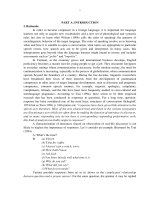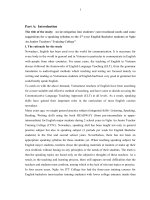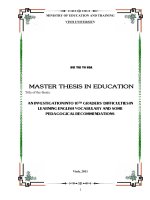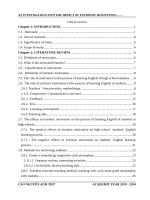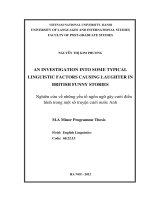Slide an investigation into some approaches to vocabulary teaching and learning and the application of games in teaching and learning vocabulary at pre – intermediate level at foreign language center – haiphong university
Bạn đang xem bản rút gọn của tài liệu. Xem và tải ngay bản đầy đủ của tài liệu tại đây (550.47 KB, 29 trang )
An investigation into some approaches to
vocabulary teaching and learning and the
application of games in teaching and learning
vocabulary at pre – Intermediate level at
Foreign Language center – haiphong university
(Nghiªn cøu mét số cách dạy- học từ vựng và thử nghiệm áp dụng các
trò chơi trong việc dạy và học từ vựng ở chơng trình B tại Trung tâm
Ngoại ngữ - Đại học Hải Phòng)
Part one: Introduction
Part two: Development
Part three: Conclusion
Part one:
Introduction
Without grammar very little can be conveyed,
without vocabulary nothing can be conveyed
(Wilkins, 1972, p.111)
1. Rationale
2. Aims of the study
3. Scope of the study
4. Methods of the study
5. Design of the study
Research questions:
What is the present situation of teaching
and learning vocabulary at Pre –
Intermediate level at FLC-HPU?
What is the main reasons of the difficulties
in vocabulary teaching and learning at Pre –
Intermediate level at FLC-HPU?
Do games help learners at Pre –
Intermediate level learn vocabulary more
effectively?
Part two:
Development
Chapter one: Literature review
1.1. Vocabulary
1.2. Vocabulary in language teaching and learning
1.3. Approaches to language teaching and their
relevance to vocabulary
1.4. Recent research about teaching and learning second
language vocabulary
1.5. Advantages of the use of games in vocabulary
teaching and learning
Part two:
Development
Chapter one: Literature review
1.1. Vocabulary
1.1.1. Definition of Vocabulary
1.1.2. Concept of words
1.1.3. Words and their meanings
1.1.4. Words use
1.1.5. Form of words
1.2. Vocabulary in language teaching and
learning
1.2.1. A neglect aspect of foreign language
methodology
1.2.2. Ineffective vocabulary learning
1.2.3. The status of vocabulary in current
language teaching and learning
1.3. Approaches to language teaching and
their relevance to vocabulary
1.4. Recent research about teaching and
learning second language vocabulary
1.5. Advantages of the use games in
vocabulary teaching and learning
Games can motivate learners by bringing
fun to classes
Games can provide language practice
Games encourage learners to interact and
communicate with one another
Games can motivate learners
by bringing fun to classes
Games are highly motivating because they
are amusing and interesting (Ersoz, 2000)
By bringing fun to the language classrooms,
games in vocabulary teaching will create a
relaxed atmosphere which helps students
remember things faster and better
Games can provide language practice
Games are used not only for mere fun, but
also more importantly for the useful
practice (Nguyen & Khuat, 2003)
Well – chosen games are invaluable as they
give students a break and at the same time
allow students to practice language skills
(Lee, 1995)
Games encourage learners to interact
and communicate with one another
When taking part in the games learners
have to talk to express or exchange their
ideas with their partners. It can lead to
better word learning. (Zimmerman, 1997)
Through interaction with others, learners
can get help from each other on the
meaning of unfamiliar words, including
vocabulary items they do not know. (Nation
and Newton, 1977, p.244)
Part two:
Development
Chapter two:
Present situation of teaching and learning English
at Pre-Intermediate level at FLC - HPU
2.1. Learners and learners’ need
2.2. Teachers and teaching methods
2.3. Material and material assessments
Part two:
Development
Chapter three:
Data collection, findings and disscusion,
some suggestions
3.1. Data collection
3.2. Findings and discussion
3.3. Application of games in vocabulary
teaching and learning
Part two:
Development
3.1. Data collection
3.1.1. The subject
3.1.2. Instrument
- Questionnaires
- Classroom observation
- Discussion & small talks
Part two:
Development
3.2. Findings and discussion
-
Both teachers and learners are deeply
influenced by traditional methods.
Learners lack sufficient practice of
vocabulary
Learners feel bored in vocabulary lessons
Most of learners (86.2%) expect their
teachers to adjust their methods to help
them study vocabulary more effectively
Part two:
Development
3.3. Application of games in vocabulary
teaching and learning
Applied games:
. Hang man
. Simon says
. Word puzzle
. Selling and Buying thing
Part two:
Development
Result of Post ’ class survey and
discussion
- Teachers’ comment
- Learners’ reaction, their progress
and expectation
a
b
c
d
1
76.6%
5.5%
14.4%
3.3%
2
45.5%
17.8%
21.1%
15.5%
3
42.2%
41.4%
12.2%
4.4%
4
25.2%
13.3%
34.4%
26.6%
Options
Questions
Table 7:
Learners’ reaction, their progress and expectation
1.What do you think of the games your
teachers used in your vocabulary lesson?
a.
b.
c.
d.
Very interesting and useful
Rather interesting and useful
Interesting and useful
Uninteresting and useless
2. How could your classmates help you to
learn vocabulary through games?
a.
b.
c.
d.
Help you to guess unknown words
Help you to recall the words you have
learnt but forgotten
Help you to remember words from the
games very quickly
Help you enrich your vocabulary
3. Has your use of vocabulary become
better since you joined the games?
a.
b.
c.
d.
Yes, much better
Yes, better
Yes, little better
No, not better at all
4. Which stage of the lesson do you want your
teachers to use games in vocabulary lessons?
a.
b.
c.
d.
In presentation
In controlled practice
In communication practice
At all stages of the lesson
